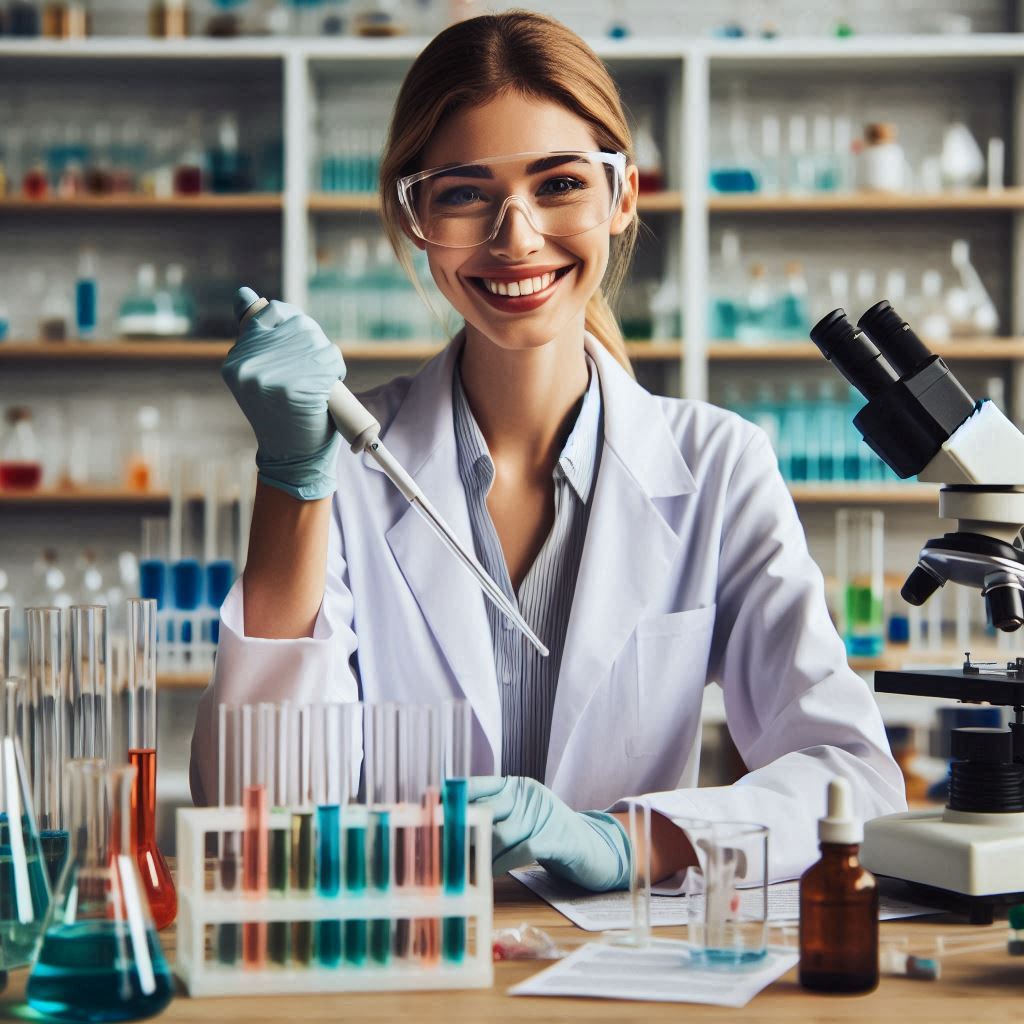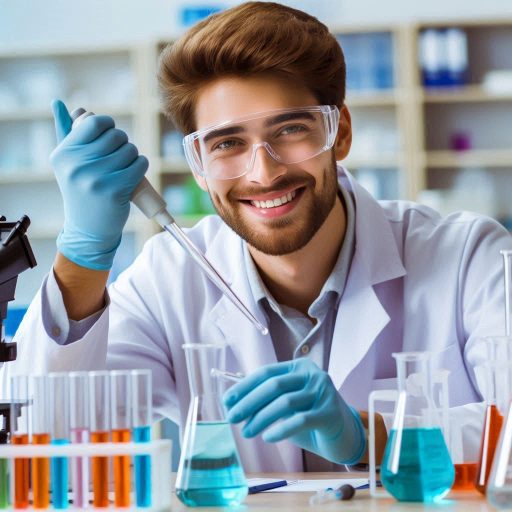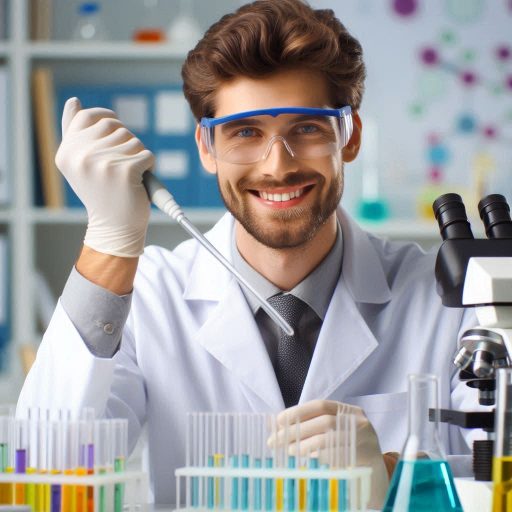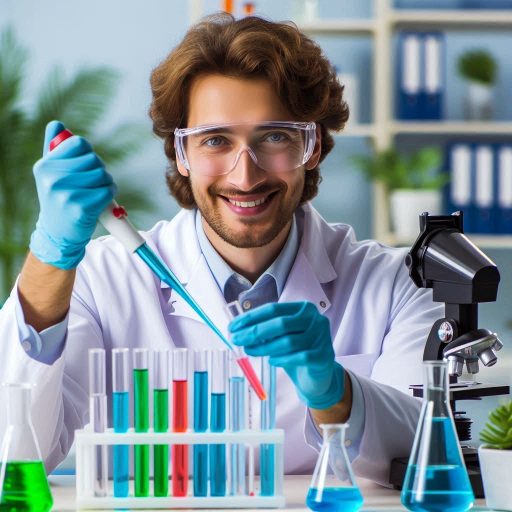Introduction
What a Laboratory Technician Does
A laboratory technician plays a vital role in both clinical and research environments.
They handle and analyze samples, perform various diagnostic tests, and use advanced lab equipment.
Their duties include preparing specimens, running tests, and ensuring the accuracy of results.
Technicians are responsible for maintaining and calibrating instruments, troubleshooting technical issues, and following strict protocols.
They meticulously document test outcomes and support research efforts by providing critical data.
Importance of Laboratory Technicians in the Healthcare Industry
Laboratory technicians are essential to the healthcare industry, as their work directly influences patient care and treatment decisions.
They provide accurate and timely diagnostic information that helps doctors diagnose conditions, monitor health, and plan appropriate treatments.
Their expertise ensures that lab results are reliable, which is crucial for effective patient management.
By contributing to precise diagnostics and research, laboratory technicians support overall healthcare quality and patient safety.
Their role is fundamental in delivering effective and efficient healthcare services, making them indispensable to the medical field.
Daily Responsibilities of a Laboratory Technician
Overview of Tasks Performed by a Laboratory Technician
Laboratory technicians perform a variety of essential tasks daily.
They start by preparing and maintaining laboratory equipment, ensuring everything is in proper working order.
Technicians conduct routine quality control checks to verify equipment accuracy.
They handle various samples, including blood, urine, and tissue, performing tests to diagnose medical conditions.
Accurate documentation of test results and maintenance of detailed records are crucial aspects of their role.
Technicians also adhere to strict safety protocols to protect themselves and maintain a sterile environment.
The Process of Sample Collection and Analysis
Sample collection is a critical responsibility for laboratory technicians.
They gather specimens using sterile techniques to avoid contamination.
Proper labeling and documentation of each sample are essential for tracking and analysis.
Once collected, technicians prepare samples by processing and mixing them as required.
They operate sophisticated equipment, such as centrifuges and spectrophotometers, to perform tests.
Each step must follow standardized procedures to ensure accurate results.
Technicians meticulously record their observations and input data into computer systems, generating reports that are crucial for medical diagnosis.
Collaborating with Healthcare Professionals to Provide Accurate Test Results
Effective collaboration with healthcare professionals is key to a laboratory technician’s role.
Technicians work closely with doctors, nurses, and other medical staff to discuss test results and provide detailed insights.
Clear and precise communication is essential to support accurate diagnoses and treatment plans.
Technicians must be adept at explaining their findings and answering questions to ensure that healthcare providers understand the test outcomes.
This teamwork is vital for delivering comprehensive patient care and ensuring that results are used effectively in medical decision-making.
Read: CAD Technician Salary: What to Expect in the USA
Work Environment of a Laboratory Technician
Description of Typical Laboratory Setting
A laboratory setting is a controlled environment designed for precise scientific work.
It typically includes clean, well-lit spaces with ample counter space for equipment and samples.
Laboratories often feature specialized areas for different types of tests, such as chemistry, microbiology, or hematology.
Safety measures, including fume hoods and eye wash stations, are integral to ensure a safe working environment.
Technicians work in a sterile environment to prevent contamination and maintain the accuracy of their results.
Equipment and Technology Used by Laboratory Technicians
Laboratory technicians use a range of equipment and technology to perform their tasks.
Common tools include microscopes for examining samples at high magnification, centrifuges for separating components of samples, and spectrophotometers for measuring light absorption.
Automated analyzers can process multiple samples simultaneously, increasing efficiency.
Technicians also use pipettes for accurate liquid measurement and computers for data management and reporting.
Proper operation and regular calibration of these instruments are crucial to ensure reliable results.
Importance of Maintaining a Clean and Organized Workspace
Maintaining a clean and organized workspace is vital in a laboratory setting.
A clutter-free environment helps prevent accidental contamination and ensures that equipment and samples are easily accessible.
Regular cleaning routines are essential to eliminate any potential sources of contamination.
Technicians must follow strict protocols for cleaning and disinfecting surfaces and equipment.
An organized workspace also enhances efficiency, allowing technicians to perform tasks swiftly and accurately.
Adherence to cleanliness and organization standards is fundamental to achieving reliable test results and ensuring overall safety in the laboratory.
Read: Top CAD Software for Aspiring CAD Technicians
Skills and Qualifications for Laboratory Technicians
Educational Requirements for Becoming a Laboratory Technician
Becoming a laboratory technician typically requires a solid educational foundation.
The minimum requirement is a high school diploma or its equivalent.
However, most employers prefer candidates with postsecondary education in a related field.
An associate degree in clinical laboratory technology or a closely related discipline is commonly required.
These programs offer a blend of classroom instruction and hands-on training, covering essential topics such as microbiology, chemistry, and clinical techniques.
In some cases, a bachelor’s degree in medical technology or a related field may be necessary, particularly for specialized roles or advanced positions.
Accredited educational programs ensure that students gain the practical skills and theoretical knowledge needed to excel in laboratory settings.
Additionally, obtaining certification from professional organizations, such as the American Society for Clinical Pathology (ASCP) or the American Medical Technologists (AMT), can enhance job prospects and demonstrate a high level of proficiency and commitment to the profession.
Necessary Skills Such as Attention to Detail and Critical Thinking
Laboratory technicians must possess a range of skills to perform their duties effectively.
Attention to detail is crucial, as even minor errors in sample handling or data recording can lead to inaccurate results.
Technicians must meticulously follow protocols and procedures to ensure the reliability of their tests.
This includes accurately measuring substances, calibrating equipment, and documenting findings.
Critical thinking skills are also essential.
Technicians need to analyze complex data, interpret test results, and troubleshoot issues that arise during the testing process.
For example, if a test result is inconsistent with expected outcomes, technicians must investigate potential causes and make necessary adjustments.
This problem-solving ability is vital for maintaining the quality and accuracy of laboratory work.
Proficiency in using various laboratory instruments and technologies is another key skill.
Technicians must operate and maintain equipment such as microscopes, centrifuges, and automated analyzers.
They also need to be comfortable with computer systems for managing data, generating reports, and conducting electronic record-keeping.
Good communication skills are necessary for effective collaboration with healthcare professionals.
Technicians must clearly document their results and provide concise explanations when discussing findings with doctors, nurses, and other medical staff.
This ensures that test results are accurately interpreted and used to inform patient care decisions.
Importance of Continuing Education to Stay Current in the Field
Continuing education is vital for laboratory technicians to keep pace with advancements in the field.
The realm of laboratory science is constantly evolving, with new technologies, techniques, and regulations emerging regularly.
Staying updated with these changes is essential for maintaining competency and providing high-quality laboratory services.
Read: How to Become a CAD Technician: Step-by-Step Guide

Discover More: Industrial Engineering Consulting Careers
Challenges and Rewards of Being a Laboratory Technician
Common Challenges Faced by Laboratory Technicians
Laboratory technicians encounter various challenges in their roles.
One common issue is managing high workloads and tight deadlines.
Laboratories often experience peak periods when numerous tests need to be processed quickly, which can be stressful.
Technicians must handle these pressures while maintaining accuracy and efficiency.
Another challenge is working with complex equipment and technology, which requires ongoing training and troubleshooting skills.
Malfunctions or calibration issues can disrupt workflows and impact test results.
Additionally, laboratory technicians are exposed to potentially hazardous materials, including chemicals and biological samples.
Ensuring safety while handling these materials is crucial and requires strict adherence to protocols.
Another challenge involves dealing with repetitive tasks, which can lead to monotony and fatigue.
Maintaining focus and avoiding errors in such conditions requires a high level of concentration.
Ways to Overcome Obstacles in the Workplace
Overcoming obstacles in the laboratory setting involves several strategies.
Time management is crucial for handling high workloads.
Prioritizing tasks and using effective scheduling techniques can help manage the workload more efficiently.
Implementing streamlined processes and utilizing laboratory information management systems (LIMS) can also enhance productivity and reduce stress.
To address equipment challenges, regular maintenance and calibration are essential.
Technicians should be trained to troubleshoot common issues and know when to seek support from technical specialists.
Continuous professional development and training can keep technicians updated on the latest technologies and best practices, helping them adapt to new equipment and procedures.
Safety is a top priority in the laboratory environment.
Technicians should follow established safety protocols rigorously and participate in regular safety training.
Using personal protective equipment (PPE) and understanding proper handling procedures for hazardous materials can minimize risks.
For managing repetitive tasks, incorporating regular breaks and finding ways to vary the work routine can help alleviate monotony.
Engaging in tasks that provide variety and challenge can also keep the job interesting and rewarding.
Fulfilling Aspects of the Job and Sense of Accomplishment
Despite the challenges, being a laboratory technician offers numerous rewards.
One of the most fulfilling aspects of the job is the contribution to patient care.
Technicians play a critical role in diagnosing medical conditions by providing accurate and timely test results.
Their work directly impacts patient treatment and recovery, which can be deeply satisfying.
Technicians often experience a sense of accomplishment from problem-solving and troubleshooting complex issues.
Successfully identifying the cause of a problem or improving a testing procedure can be rewarding and enhance job satisfaction.
Additionally, working in a collaborative environment with healthcare professionals fosters a sense of teamwork and shared purpose.
Another rewarding aspect is the opportunity for continuous learning and professional growth.
The field of laboratory science is dynamic, offering technicians the chance to expand their knowledge and skills regularly.
Advancements in technology and methodology provide opportunities for career advancement and specialization.
Overall, the sense of purpose derived from helping patients and contributing to the healthcare system makes the challenges worthwhile.
The impact of their work on patient outcomes and the satisfaction of overcoming obstacles contribute to a fulfilling career as a laboratory technician.
Read: Surveying and Mapping Technician Internships: A Guide
Find Out More: The Evolution of Aerospace Engineering Over the Decades
Transform Your Career Today
Unlock a personalized career strategy that drives real results. Get tailored advice and a roadmap designed just for you.
Start NowCareer Advancement Opportunities for Laboratory Technicians
Potential Career Paths for Laboratory Technicians
Laboratory technicians have various career advancement opportunities within the healthcare and scientific fields.
One common path is to advance to a laboratory supervisor or manager position.
In these roles, technicians oversee the daily operations of a lab, manage staff, and ensure adherence to quality standards.
Another option is moving into specialized fields, such as clinical chemistry, microbiology, or molecular biology, where technicians can focus on specific areas of interest.
Technicians can also transition into research roles, working in academic or private research laboratories.
This path often involves participating in or leading research projects and contributing to scientific discoveries.
Additionally, some technicians choose to pursue roles in medical sales or consulting, leveraging their technical expertise to advise on laboratory equipment and processes.
Another avenue for career growth is to pursue education and training to become a clinical laboratory scientist or medical technologist.
These advanced roles often involve greater responsibilities, including interpreting complex test results and developing new diagnostic tests.
Certification and Specialization Options in the Field
Certification and specialization can significantly enhance a laboratory technician‘s career prospects.
Various certifications are available through professional organizations, such as the American Society for Clinical Pathology (ASCP) and the American Medical Technologists (AMT).
Certifications such as the Certified Medical Laboratory Technician (MLT) or Certified Laboratory Technician (CLT) can improve job prospects and validate a technician‘s skills and knowledge.
Specialization options allow technicians to focus on specific areas of laboratory science.
For example, certifications in areas like hematology, microbiology, or immunology can position technicians as experts in these fields.
Specialized training can also lead to roles in advanced diagnostic laboratories or research settings.
Benefits of Pursuing Additional Training and Development
Pursuing additional training and development offers several benefits for laboratory technicians.
Enhanced skills and knowledge gained through further education can open doors to advanced positions and higher salaries.
Technicians who stay current with technological advancements and best practices are better equipped to handle complex tasks and contribute to innovative research.
Additional training often provides opportunities for career specialization, allowing technicians to become experts in niche areas of laboratory science.
This can lead to more fulfilling roles and increased job satisfaction.
Furthermore, ongoing professional development helps technicians maintain certifications and meet the continuing education requirements set by certifying bodies.
Engaging in continuous learning also improves job performance and can lead to greater recognition and leadership opportunities within the workplace.
Technicians who invest in their professional growth demonstrate a commitment to their field, which can positively impact their career trajectory and overall job satisfaction.
Overall, career advancement for laboratory technicians involves exploring various paths, obtaining relevant certifications, and pursuing additional training.
These efforts not only enhance professional skills but also contribute to a more rewarding and dynamic career.
Learn More: Effective Communication for IT Support Specialists
Conclusion
The Daily Life of a Laboratory Technician
A laboratory technician‘s day is filled with various tasks, including conducting tests, analyzing samples, and maintaining lab equipment.
They start by preparing samples and calibrating instruments.
Throughout the day, they conduct various analyses, ensuring that results are accurate and reliable.
They also troubleshoot equipment issues and document all findings meticulously.
Cleaning and maintaining equipment is a routine part of their responsibilities.
Importance of Laboratory Technicians in Healthcare
Laboratory technicians play a crucial role in healthcare by providing essential diagnostic information.
Their work enables doctors to diagnose and treat patients effectively.
Accurate lab results are critical for identifying diseases, monitoring health conditions, and making informed treatment decisions.
Their expertise supports overall patient safety and contributes to high-quality healthcare.
Encouragement for Those Interested in Pursuing a Career in Laboratory Technology
For those interested in this field, a career in laboratory technology can be highly rewarding.
It offers the chance to work at the forefront of medical science and make a significant impact on patient care.
If you enjoy working with technology and have a passion for science, consider pursuing this career path.
It combines technical skills with the satisfaction of contributing to vital healthcare services.
[E-Books for Sale]
The Big Book of 500 High-Paying Jobs in America: Unlock Your Earning Potential
$19.99 • 500 High-Paying Jobs • 330 pages
Explore 500 high-paying jobs in America and learn how to boost your career, earn more, and achieve success!
See All 500 High-Paying Jobs of this E-Book
1001 Professions Without a Degree: High-Paying American Jobs You Can Start Now
$19.99 • 1001 Professions Without a Degree • 174 pages
Discover 1001 high-paying jobs without a degree! Unlock career tips, skills, and success strategies for just $19.99!




